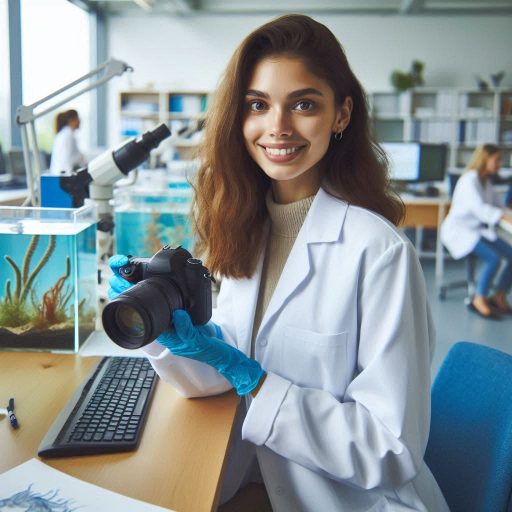Introduction
Marine Biologist in Coral Reef Conservation play a crucial role in coral reef conservation, working directly to protect these vital ecosystems.
Coral reefs support marine biodiversity, offering shelter and food to countless species.
However, they face numerous threats, including climate change, pollution, and overfishing.
These issues cause coral bleaching, habitat loss, and a decline in marine life.
Marine biologists possess specialized knowledge in marine ecosystems, equipping them to address these challenges.
Their expertise includes monitoring coral health, studying marine species, and developing restoration strategies.
They conduct field research, collect data, and analyze environmental impacts on coral reefs.
This research informs conservation efforts and helps shape policies to protect these delicate environments.
Through collaboration with governments, organizations, and local communities, marine biologists help create sustainable solutions.
They also engage in public education to raise awareness about coral reefs and their importance.
Marine biologists work tirelessly to ensure that coral reefs continue to thrive for future generations.
Without their efforts, the survival of coral reefs would be in even greater jeopardy.
Overview of Coral Reefs
What Are Coral Reefs?
Coral reefs are complex, underwater ecosystems made primarily of calcium carbonate.
These structures are created by colonies of small marine animals called coral polyps.
Found in shallow, warm ocean waters, coral reefs are often referred to as the “rainforests of the sea” due to their incredible biodiversity.
Why Are Coral Reefs Important?
Coral reefs are crucial to both marine life and humans.
They protect coastlines from storms, reduce erosion, and provide habitat for countless marine species.
Additionally, coral reefs support fisheries that supply food for over a billion people worldwide.
They are also a source of income for many coastal communities through tourism and recreation.
Coral reefs even hold potential for medical research, with many organisms producing compounds used in treatments for cancer and other diseases.
Biodiversity and Ecosystems Supported by Coral Reefs
Coral reefs are home to around 25% of all marine species, despite covering less than 1% of the ocean floor.
These ecosystems are teeming with life, from fish and mollusks to sea turtles and sharks.
The intricate structure of coral reefs provides shelter and breeding grounds for numerous marine species.
This biodiversity supports complex food webs and maintains the health of the oceans.
Coral reefs also contribute to global carbon and nitrogen cycles, playing an essential role in maintaining the planet‘s ecological balance.
Threats Facing Coral Reefs
Unfortunately, coral reefs are facing multiple threats that endanger their survival.
Climate change is one of the most significant threats.
Rising ocean temperatures cause coral bleaching, where corals lose their vibrant colors and become more vulnerable to disease.
Ocean acidification, another result of climate change, weakens coral skeletons, making them more fragile.
Pollution from land-based sources, such as agricultural runoff and plastic waste, also harms coral reefs.
Sediment, nutrients, and chemicals from human activities can smother coral, block sunlight, and promote the growth of harmful algae.
These pollutants disrupt the delicate balance of coral ecosystems, leading to further damage.
Overfishing is another major issue threatening coral reefs.
Unsustainable fishing practices, like blast fishing and cyanide fishing, directly destroy coral structures.
The removal of key species, such as herbivorous fish, upsets the natural balance of reef ecosystems.
Without these fish to keep algae in check, coral reefs can become overrun, leading to their decline.
Coral reefs are indispensable to marine life and human society.
Their rich biodiversity and ecological significance make them one of the most vital ecosystems on Earth.
However, they face grave threats from climate change, pollution, and overfishing.
Conservation efforts led by marine biologists are critical to ensuring the survival of these fragile ecosystems.
Read: Profiles in Success: Leading Chemists of the 21st Century in the US
Role of Marine Biologists
Studying Coral Reefs: Understanding the Ecosystem
Marine biologists play a vital role in understanding coral reef ecosystems.
They conduct underwater surveys, mapping the reef‘s structure.
They also study the species that inhabit coral reefs, analyzing interactions between fish, invertebrates, and corals.
This research helps scientists understand how reefs function and respond to changes.
By studying coral growth rates and reproduction patterns, marine biologists gather critical data.
This information reveals the health of coral reefs and predicts future changes.
Through this, marine biologists contribute to the protection and sustainable management of these delicate ecosystems.
Skills and Knowledge Required for Coral Reef Research
Marine biologists specializing in coral reefs need a unique set of skills.
They must be proficient in underwater diving techniques, often requiring scuba certification.
Strong observational skills are essential for noting subtle changes in coral health.
Marine biologists must also be knowledgeable in marine ecology, oceanography, and biology.
Data collection and analysis skills are vital, as research involves gathering large amounts of information.
They must also understand environmental policies to make informed decisions.
Technical proficiency in using GPS devices, underwater cameras, and drones is necessary for mapping and documenting reefs.
How marine biologists contribute to coral reef conservation efforts through research and monitoring
Research by marine biologists is crucial for coral reef conservation.
By monitoring coral health over time, they detect early signs of stress or damage.
This allows for timely interventions to prevent further harm to reefs.
Marine biologists also track the impacts of climate change on coral reefs.
For example, they study coral bleaching events and identify the factors causing them.
Through this, they can recommend ways to mitigate these effects.
Marine biologists contribute to conservation efforts by conducting genetic research.
They explore coral species‘ ability to adapt to changing environmental conditions, which helps guide restoration efforts.
Marine biologists often work closely with local communities and governments.
They collaborate on creating marine protected areas (MPAs) that safeguard vulnerable coral reefs.
They provide scientific evidence to support policies that limit harmful human activities like overfishing or coastal development.
Marine biologists also engage in public education, raising awareness about the importance of coral reefs.
Through outreach programs, they help promote sustainable practices that benefit both reefs and local economies.
By building these partnerships, marine biologists ensure that conservation efforts are both effective and long-lasting.
Marine biologists are essential in the fight to protect coral reefs.
Their research, monitoring, and partnerships drive successful conservation strategies.
Their expertise helps maintain the health of coral reefs, which are vital to marine biodiversity.
Through their efforts, marine biologists play a key role in preserving these irreplaceable ecosystems for future generations.
Read: The Life and Times of a U.S. Physicist: A Day in Detail
Conservation Strategies
Different Conservation Strategies Used By Marine Biologists To Protect Coral Reefs And Their Importance
Marine biologists employ several conservation strategies to protect coral reefs from damage and destruction.
These strategies focus on preserving reef ecosystems, restoring damaged areas, and preventing further harm.
The importance of marine protected areas and sustainable fishing practices
Marine Protected Areas (MPAs) serve as a key tool in coral reef conservation.
Marine biologists designate MPAs to restrict harmful human activities in reef ecosystems.
These areas help reduce overfishing, limit coastal development, and control pollution, which can severely damage coral reefs.
MPAs also act as safe zones for marine species to reproduce and grow, helping maintain biodiversity.
Protecting these areas ensures that coral reefs can recover from environmental stressors like climate change, coral bleaching, and ocean acidification.
By setting clear boundaries and regulations, MPAs provide a safe space for reefs to thrive.
Sustainable Fishing Practices
Overfishing threatens the delicate balance of coral reef ecosystems.
Marine biologists work to promote sustainable fishing practices to mitigate this issue.
Implementing size limits, seasonal bans, and protected species lists helps to reduce pressure on fish populations.
By managing fisheries responsibly, marine biologists prevent ecosystem collapse and help maintain healthy reefs.
They encourage using selective fishing methods to avoid harming non-target species or damaging coral structures.
Sustainable fishing also includes limiting destructive methods like trawling and cyanide fishing, which can devastate reef habitats.
Coral Restoration Projects
Coral restoration is an active strategy for marine biologists to revive damaged coral reefs.
These projects involve transplanting healthy coral fragments to degraded areas to stimulate natural growth.
Marine biologists select resilient coral species, considering their ability to withstand changing ocean conditions.
They also develop coral nurseries, where fragments grow before being relocated to damaged reefs.
Through restoration, marine biologists can help reefs recover faster from bleaching events or physical damage.
Coral restoration techniques are constantly evolving to meet the challenges posed by climate change and human activity.
Community Engagement and Education
Community engagement is essential in coral reef conservation.
Marine biologists collaborate with local communities to raise awareness about the importance of coral reefs.
Education programs teach people how their actions can impact reef ecosystems.
These initiatives encourage sustainable behaviors, such as reducing plastic use, supporting responsible tourism, and avoiding harmful fishing practices.
By involving communities, marine biologists create long-term solutions for reef protection.
Local stakeholders become active participants in conservation efforts, ensuring the strategies are sustainable and impactful.
Technology plays a vital role in coral reef conservation.
Marine biologists use satellite imagery and underwater drones to monitor reef health.
These tools provide real-time data on water temperature, coral bleaching, and fish populations.
They also allow scientists to track illegal fishing activities and assess the impact of human actions.
By utilizing advanced technology, marine biologists can respond quickly to threats and implement effective conservation measures.
Marine biologists use various conservation strategies, including MPAs, sustainable fishing, coral restoration, community engagement, and technology.
These efforts protect coral reefs from further degradation and help restore their ecological balance.
Read: Salary Ranges: What to Expect as a Physicist in the USA
Coral Reef Restoration
Coral reef restoration is a vital practice aimed at reviving damaged or declining reef ecosystems.
This process involves several techniques to rehabilitate coral reefs and restore their ecological balance.
Marine biologists play a central role in coral reef restoration, combining science and practical methods to rebuild these critical habitats.
The Process of Coral Reef Restoration And The Role of Marine Biologists in This Practice
Marine biologists begin by assessing the health and structure of damaged coral reefs.
This evaluation helps determine the best restoration approach for each unique reef.
Restoration typically involves coral propagation, where healthy coral fragments are grown in nurseries.
These nurseries mimic natural conditions, providing a controlled environment for corals to grow.
Once these fragments reach an optimal size, marine biologists transplant them back to damaged reef sites.
Another common method is the use of artificial reefs.
Marine biologists create artificial structures to serve as substrates for coral growth.
These structures, made from materials like steel or limestone, encourage coral larvae to settle and develop into mature coral colonies.
Over time, artificial reefs become thriving ecosystems that mimic natural coral reefs.
Marine biologists oversee every stage of this process, ensuring that the restoration efforts align with local ecosystems.
Techniques: Coral Propagation and Artificial Reefs
Coral propagation is a widely used technique in reef restoration.
It involves fragmenting healthy corals and growing them in controlled environments.
Marine biologists carefully select coral species that are resilient and able to adapt to changing conditions.
In nurseries, marine biologists monitor coral growth, adjusting factors such as water quality, light, and temperature.
Once the corals are strong enough, they are transplanted back to damaged reefs.
This technique helps restore coral populations that have been severely depleted by climate change, pollution, or destructive fishing practices.
Artificial reefs also play a crucial role in restoration.
Marine biologists design and build structures that provide a solid foundation for coral attachment.
These structures can be tailored to local environmental conditions, ensuring compatibility with the surrounding marine ecosystem.
The artificial reefs not only support coral growth but also attract marine life, providing shelter and breeding grounds for various species.
Marine biologists continually monitor the artificial reefs, collecting data to improve future restoration efforts.
Transform Your Career Today
Unlock a personalized career strategy that drives real results. Get tailored advice and a roadmap designed just for you.
Start NowSuccess Stories of Coral Reef Restoration
Several coral reef restoration projects have demonstrated remarkable success.
In the Florida Keys, marine biologists restored over 25,000 square meters of reef using coral propagation techniques.
The project led to the re-establishment of healthy coral populations and the return of marine life.
Another success story comes from Australia‘s Great Barrier Reef, where marine biologists used artificial reefs to rehabilitate damaged areas.
These projects not only revitalized ecosystems but also provided valuable insights into large-scale restoration efforts.
Coral reef restoration continues to evolve, with marine biologists at the forefront of innovation.
Their work is essential in ensuring the survival of coral reefs and the many species that rely on them.
Read: Physics Specializations: Choosing Your Path in the U.S.

Challenges Faced by Marine Biologists
Marine biologists play a vital role in coral reef conservation.
However, they face several challenges and obstacles that can hinder their efforts.
Understanding these challenges is crucial for supporting their work and ensuring the health of coral reefs.
The Challenges and Obstacles Faced by Marine Biologists in Their Work
Marine biologists encounter various hurdles in their mission to protect coral reefs.
These challenges can come in many forms, affecting their research and conservation efforts.
Identifying and addressing these obstacles is essential for effective coral reef conservation.
Funding Limitations, Technological Constraints, and Regulatory Issues
One significant challenge marine biologists encounter is funding limitations.
Many research projects rely on grants and donations for financial support.
However, funding for marine research can be competitive and scarce.
When funding falls short, it limits the scope of their research.
This lack of resources can hinder essential conservation initiatives, delaying progress in protecting coral reefs.
Marine biologists also grapple with technological constraints.
The study of coral reefs often requires advanced equipment and technology.
For example, underwater drones and remote sensing tools can aid in monitoring reef health.
However, not all research institutions have access to these technologies.
This limitation can restrict data collection and analysis, impacting the effectiveness of conservation strategies.
Regulatory issues pose another challenge for marine biologists.
Governments and regulatory bodies often impose strict guidelines for research and conservation efforts.
While these regulations aim to protect marine environments, they can slow down research processes.
For instance, obtaining permits for research can be time-consuming.
This bureaucracy can delay critical conservation projects, leaving coral reefs vulnerable to threats.
Emotional Toll of Witnessing Coral Reef Degradation Firsthand
The emotional toll of witnessing coral reef degradation can weigh heavily on marine biologists.
Coral reefs are incredibly diverse ecosystems that provide habitat for countless marine species.
However, climate change, pollution, and overfishing threaten their survival.
Marine biologists often witness the impacts of these threats firsthand.
This experience can lead to feelings of helplessness and frustration.
Witnessing the decline of coral reefs can take an emotional toll, affecting their mental well-being.
Despite these challenges, many marine biologists remain resilient and dedicated to their work.
They develop innovative solutions to address funding limitations, technological constraints, and regulatory issues.
Collaboration with other researchers, conservation organizations, and policymakers can help overcome obstacles.
For example, pooling resources and sharing technologies can enhance research efforts.
Additionally, advocating for increased funding for marine research can drive support for conservation initiatives.
Raising awareness about the challenges marine biologists face is crucial.
Public understanding can foster support for funding and policy changes that benefit coral reef conservation.
Engaging the community through education and outreach programs can inspire individuals to take action.
When people understand the importance of coral reefs, they may be more willing to support conservation efforts.
Marine biologists face numerous challenges in their quest to conserve coral reefs.
Funding limitations, technological constraints, regulatory issues, and emotional tolls can impede their work.
However, their resilience and dedication drive them to continue fighting for these vital ecosystems.
By raising awareness and fostering support, we can help marine biologists succeed in their mission to protect coral reefs for future generations.
Explore Further: How to Choose the Right Biomedical Engineering Program
Collaboration and Partnerships
Importance of Collaboration Between Marine Biologists, Local Communities, and Government Agencies
Collaboration is critical to coral reef conservation.
Marine biologists alone cannot protect these ecosystems.
They need support from local communities, government agencies, and other stakeholders.
Partnerships create a unified approach, combining resources and expertise.
Each group brings valuable knowledge and skills to the table.
Together, they develop strategies that are more effective and sustainable.
Without collaboration, coral reef conservation efforts can become fragmented and inefficient.
Marine biologists work closely with local communities to ensure coral reefs’ protection.
Local knowledge is often overlooked, yet it is essential for effective conservation.
These communities have lived near coral reefs for generations.
They understand the ecosystems in ways that scientists may not.
By listening to them, marine biologists gain valuable insights.
This collaboration builds trust and creates solutions that are culturally sensitive and realistic.
Local involvement ensures long-term conservation success.
Government agencies provide the legal framework and funding necessary for coral reef conservation.
Policies and regulations are vital for protecting marine environments.
Marine biologists rely on these agencies to enforce laws against overfishing, pollution, and habitat destruction.
Additionally, government support helps fund research projects and conservation initiatives.
By working together, marine biologists and government bodies ensure that coral reef conservation efforts align with national environmental goals.
This partnership strengthens both the scientific and political aspects of conservation.
Role of Non-Profit Organizations And Research Institutions In Supporting Coral Reef Conservation Efforts
Non-profit organizations and research institutions play a crucial role in coral reef conservation.
They offer financial support, research capabilities, and public outreach.
These organizations often fund important research and conservation projects.
They raise awareness about the importance of coral reefs and the threats they face.
Research institutions contribute by providing data and technological advancements.
Together, they complement the work of marine biologists, creating a comprehensive approach to conservation.
Successful Partnerships in Coral Reef Conservation
Successful collaborations have already made significant strides in coral reef conservation.
For example, the Coral Triangle Initiative has brought together six countries, local communities, and scientists.
This partnership has helped protect one of the most biodiverse coral reef regions in the world.
Another example is the Mesoamerican Reef Fund.
It unites governments, conservationists, and local communities to protect the second-largest coral reef system.
These partnerships demonstrate the power of collective action.
To achieve lasting coral reef conservation, collaboration must continue to grow.
Marine biologists, local communities, government agencies, non-profits, and research institutions all have a role to play.
By working together, they can address the complex challenges facing coral reefs.
This unified effort ensures that conservation strategies are sustainable and effective.
Strong partnerships are the key to protecting coral reefs for future generations.
Coral reef conservation is a shared responsibility.
Successful partnerships between marine biologists, communities, and various organizations can create lasting change.
Collaborative efforts lead to innovative solutions and, ultimately, the protection of these vital ecosystems.
Find Out More: Microbiologists in Pharmaceuticals: Key Roles
Future of Coral Reef Conservation
The future of coral reefs and the role of marine biologists in their conservation
Coral reefs face significant threats, including climate change, pollution, and overfishing.
As these ecosystems decline, the role of marine biologists becomes even more critical.
They will lead efforts to protect and restore coral reefs.
In the coming years, the future of coral reef conservation relies heavily on their expertise and dedication.
Emerging Technologies for Coral Reef Protection
Emerging technologies hold great promise for coral reef conservation.
One such technology is gene editing.
Scientists can enhance coral resilience against heat stress using CRISPR technology.
This approach could help corals withstand rising sea temperatures and acidification.
Marine biologists will spearhead these projects, ensuring ethical and effective applications.
Another exciting development is the use of drones for monitoring coral reefs.
Drones can cover vast areas quickly and collect valuable data.
Marine biologists can analyze this data to track reef health and identify threats.
This technology allows for proactive management and timely interventions.
Remote sensing technology also plays a crucial role in coral reef monitoring.
Satellites provide large-scale data on sea surface temperatures and ocean conditions.
Marine biologists can use this information to assess coral bleaching events.
By identifying patterns, they can predict future bleaching events and develop strategies to mitigate impacts.
Artificial intelligence (AI) can revolutionize data analysis in coral research.
AI algorithms can process vast amounts of data rapidly.
This capability enables marine biologists to identify trends and patterns in coral health.
Additionally, AI can help assess the effectiveness of conservation measures, allowing for data-driven decision-making.
Transform Your Career Today
Unlock a personalized career strategy that drives real results. Get tailored advice and a roadmap designed just for you.
Start NowThe Need for Continued Efforts
Despite these advancements, continued efforts in coral reef conservation remain essential.
Marine biologists must engage with local communities to promote sustainable practices.
Education and awareness are crucial for fostering a sense of responsibility toward coral reefs.
Community involvement can lead to more effective conservation initiatives.
Policy advocacy also plays a vital role in the future of coral reefs.
Marine biologists must work with policymakers to implement protective measures.
Stronger regulations on fishing and pollution will help safeguard these ecosystems.
Collaborative efforts between scientists and lawmakers can create a sustainable framework for coral reef conservation.
Innovation will be critical in addressing emerging threats to coral reefs.
For example, the development of coral nurseries can aid restoration efforts.
Marine biologists can cultivate corals in controlled environments and transplant them to damaged reefs.
This approach increases coral survival rates and supports ecosystem recovery.
Moreover, research into alternative livelihoods for fishing communities can reduce pressure on coral reefs.
Marine biologists can help develop sustainable tourism initiatives that benefit both communities and coral ecosystems.
By promoting eco-friendly practices, they can encourage local stakeholders to protect coral reefs.
The future of coral reef conservation looks promising, thanks to marine biologists and emerging technologies.
However, challenges remain.
Continued innovation and collaborative efforts will be vital in ensuring the survival of coral reefs.
Together, we can protect these vital ecosystems for generations to come.
Conclusion
Marine biologists play a crucial role in coral reef conservation by studying ecosystems and developing preservation strategies.
They monitor reef health, assess threats, and work to restore damaged areas.
Through research, they identify the causes of coral bleaching and advocate for sustainable practices.
These professionals collaborate with governments and communities to protect marine biodiversity and implement environmental policies.
Coral reefs face significant threats from climate change, pollution, and overfishing.
Without active intervention, these vital ecosystems may vanish.
By preserving coral reefs, we safeguard marine life, protect coastal regions, and maintain natural resources for future generations.
Everyone can contribute to coral reef conservation.
Support marine research organizations, reduce plastic waste, and advocate for sustainable seafood practices.
Small changes lead to a global impact.
The work of marine biologists is essential to saving coral reefs, but they can‘t do it alone.
Together, we must protect these vibrant underwater ecosystems and ensure their survival.
Join the movement today and help preserve coral reefs for future generations.
Every effort counts in the fight to protect our oceans.




